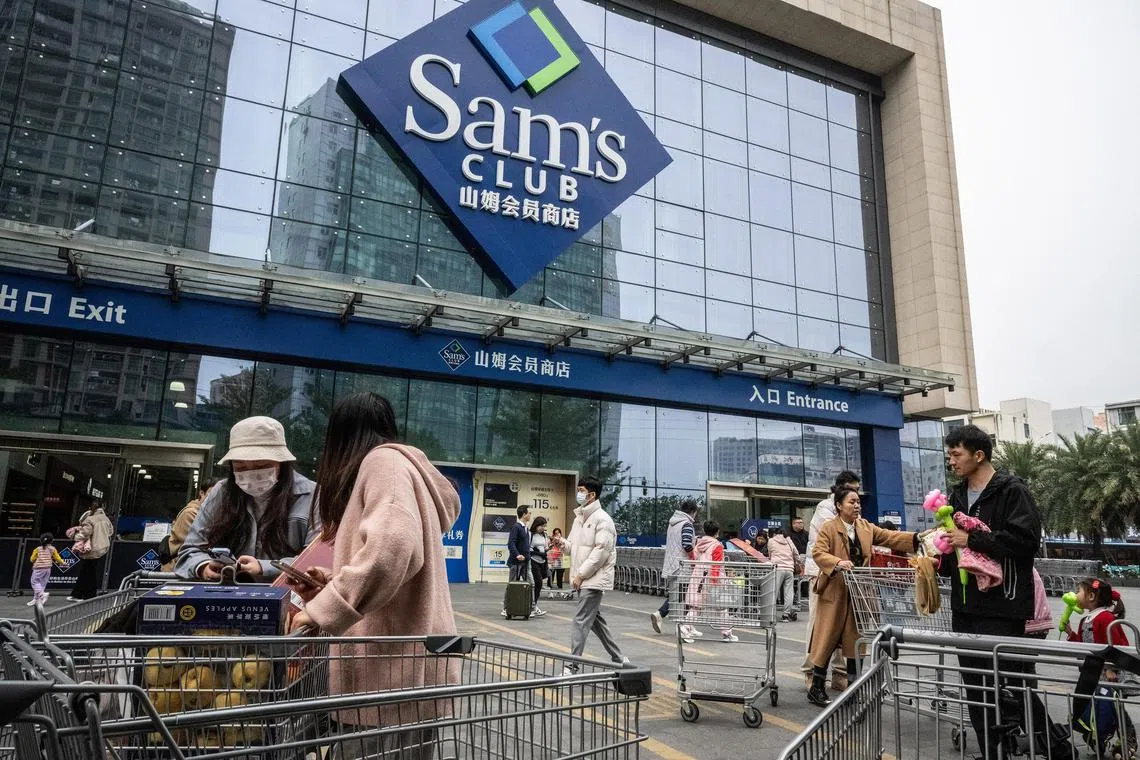Walmart’s doing so well in China it doesn’t need JD.com anymore
Sign up now: Get ST's newsletters delivered to your inbox

Walmart has done well in China, in part because of the popularity of its Sam's Club warehouse stores.
PHOTO: NYTIMES
BEIJING - Walmart is flying so high on the strength of its Chinese operations that it has exited a long-time local partnership, an outlier in a consumer landscape that is increasingly hostile to foreign brands.
As other Western consumer giants exit China or lose market share to local rivals, the US retailer remains its biggest hypermarket operator. That is thanks in large part to Sam’s Club, which in the country is a members-only chain offering premium goods.
The franchise is continuing to drive double-digit sales growth, Walmart executives said on an earnings call in August, and half of all China sales are digital.
The booming demand for Sam’s Club made it possible for Walmart to build its own e-commerce app, a rarity in China, where major Western retailers mostly rely on local platforms like Alibaba Group Holding’s Taobao and Tmall.
The number of e-commerce orders being delivered within one hour rose 28 per cent in the last quarter, to 59 million, Walmart said.
And the Sam’s Club’s membership model has been so successful it is being copied by some competitors.
“Customers are responding favourably to the increased convenience as we scale pickup and delivery capabilities,” chief finance officer John David Rainey said on the call.
Eight years ago, Walmart needed tech giant JD.com’s e-commerce infrastructure. Now, while it still depends on JD.com’s courier services, it has established its own logistics infrastructure, including its app and expanded warehouse network.
Walmart sold its entire stake in JD.com this week, raising some US$3.6 billion (S$4.7 billion) and reflecting confidence in the fact that it can now bet solely on itself in China.
Walmart is looking across its portfolio and deciding where to invest, including in its own technologies and capabilities, according to a person familiar with the matter.
The retailer will continue to focus its business in China, the person said, one of its international growth markets alongside India and Mexico.
The break is another blow to Chinese tech giants, as an economic slowdown and consumers’ pullback weighs on earnings.
Shares of JD.com, which has been battling rivals like Alibaba and Temu owner PDD Holdings, fell in Hong Kong after the sale was reported.
“The e-commerce landscape has changed significantly since Walmart first formed a relationship with JD.com,” said Mr Mark Tanner, managing director at marketing agency China Skinny.
Post-sale, “Walmart will be able to double down its focus and capital on Sam’s Club, which is its sweet spot in the market and offers the most potential upside”, he said.
Walmart stands out not just in the supermarket space, but across China, where both foreign and local businesses are facing a pullback in demand as the economy slows.
The company was the only one of China’s five largest hypermarkets whose sales grew in 2023. France’s Carrefour shut more than 140 mainland stores in 2023, leaving just four remaining, while Britain’s Tesco has exited the market entirely.
It is also bucking the trend of previously successful Western brands now struggling in China. Starbucks is exploring a strategic partnership of its own as local rivals surge, and Nike, beset by rising consumer nationalism, has softened its China outlook. BLOOMBERG


